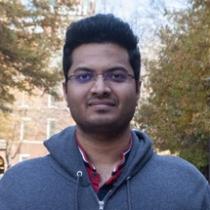
Murali Gopal Muraleedharan
What is your next adventure?
I will be moving to Pennsylvania to begin a post-doc position at Penn State with Dr. Adri Van Duin, a pioneer in the development of the Reaction Force Field. That describes the relationship of the energy of a system as a function of interatomic distances. I've been modeling heat transport and chemical reactions independently. There's still an open-ended question about how they interact with each other. I'll be developing a whole new method that unifies these two processes.
A week before I move, I will become officially engaged to my girlfriend. We will be participating in the traditional engagement ritual with my family in India by Skype.
What about your next adventure are you most looking forward to?
This research is totally new. There's not any literature on it, so there's room for me to publish something of significance. Dr. Van Duin has always been curious about this topic, and now he's got the right candidate to move the research forward.
Did you have any previous co-op, internship, or research experience in this area?
At Tech, my research has focused on heat transport properties of condensed phases under the direction of Dr. Asegun Henry (ME) and Dr. Vigor Yang (AE). This has been very involved. The most difficult part has been nailing my thesis down. I started with a different hypothesis but narrowed it down further using computational and theoretical methods.
I did spend a summer interning at Jawaharlal Nehru Centre for Advanced Scientific Research (JNC ASR) where I experimentally measured the collision properties of granule materials. That led me to fundamental research on flow properties of dilute gases.
How did your educational experience at Georgia Tech help you to achieve your goals?
Georgia Tech made me much more resilient. I came to Tech from an undergraduate program where I was fortunate to receive high grades, but not to ask questions or to face failure. At Tech I had to face challenges I'd never encountered before and problems that sometimes ended in failure. It was the failures and the comebacks that made me resilient. They taught me the value of humility, and of a good work ethic.
Sometimes my professors would give me a problem that would take at least 70 hours to solve, and tell me to give it back in a week. My first reaction was, well, I was baffled.
And then I started doing it.
Those sorts of challenges worked me much harder than my undergraduate program. And that work paid off. I am more productive now, more disciplined. I keep to a schedule and manage my time. The results are worth it.
What advice would you give to an underclassman who would like to follow the same path?
My most important advice is from what I learned: having excellent academics is great, but to be successful, you have to be ready for setbacks. Keep moving. You'll be trying to solve hard problems so you'll fail.
The second thing is, be aware of real-world problems that you are trying to solve. Don't try to get a Ph.D. for the sake of getting a Ph.D. Have a bigger purpose in mind. My ultimate goal is to work on creating clean and sustainable energy. I will be working on phenon-mediated catalysis.